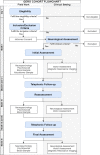GERO Cohort Protocol, Chile, 2017-2022: Community-based Cohort of Functional Decline in Subjective Cognitive Complaint elderly
- PMID: 33238908
- PMCID: PMC7690082
- DOI: 10.1186/s12877-020-01866-4
GERO Cohort Protocol, Chile, 2017-2022: Community-based Cohort of Functional Decline in Subjective Cognitive Complaint elderly
Abstract
Background: With the global population aging and life expectancy increasing, dementia has turned a priority in the health care system. In Chile, dementia is one of the most important causes of disability in the elderly and the most rapidly growing cause of death in the last 20 years. Cognitive complaint is considered a predictor for cognitive and functional decline, incident mild cognitive impairment, and incident dementia. The GERO cohort is the Chilean core clinical project of the Geroscience Center for Brain Health and Metabolism (GERO). The objective of the GERO cohort is to analyze the rate of functional decline and progression to clinical dementia and their associated risk factors in a community-dwelling elderly with subjective cognitive complaint, through a population-based study. We also aim to undertake clinical research on brain ageing and dementia disorders, to create data and biobanks with the appropriate infrastructure to conduct other studies and facilitate to the national and international scientific community access to the data and samples for research.
Methods: The GERO cohort aims the recruitment of 300 elderly subjects (> 70 years) from Santiago (Chile), following them up for at least 3 years. Eligible people are adults not diagnosed with dementia with subjective cognitive complaint, which are reported either by the participant, a proxy or both. Participants are identified through a household census. The protocol for evaluation is based on a multidimensional approach including socio-demographic, biomedical, psychosocial, neuropsychological, neuropsychiatric and motor assessments. Neuroimaging, blood and stool samples are also obtained. This multidimensional evaluation is carried out in a baseline and 2 follow-ups assessments, at 18 and 36 months. In addition, in months 6, 12, 24, and 30, a telephone interview is performed in order to keep contact with the participants and to assess general well-being.
Discussion: Our work will allow us to determine multidimensional risks factors associated with functional decline and conversion to dementia in elderly with subjective cognitive complain. The aim of our GERO group is to establish the capacity to foster cutting edge and multidisciplinary research on aging in Chile including basic and clinical research.
Trial registration: NCT04265482 in ClinicalTrials.gov. Registration Date: February 11, 2020. Retrospectively Registered.
Keywords: Alzheimer; Cognitive aging; Dementia; Functional decline; Geroscience; Subjective cognitive complaint.
Conflict of interest statement
The authors declare that they have no competing interests. The “Geroscience Center for Brain Health and Metabolism” is funded by the National Agency of Research and Technology (“Agencia Nacional de Investigación y Tecnología, ANIT”), entity under the Chilean Ministry of Science and Technology, through the Priority Areas Research Center Founding (“Fondo de Financiamiento de Centros de Investigación en Áreas Prioritarias, FONDAP”) N° 1510012. The project was founded in 2015 with US$5.284.791 (equivalent to national currency), for a period of 5 years (2015–2020). (
References
-
- United Nations . World population prospects: the 2015 revision, key findings and advance tables. Working paper no. ESA/P/WP.241.World population prospects. New York: United Nations; 2015.
-
- Comisión Económica para América Latina y el Caribe [CEPAL] -Economic Commission for Latin America and the Caribbean. Panorama Social de América Latina (LC/G. 2635-P). Santiago; 2014.


